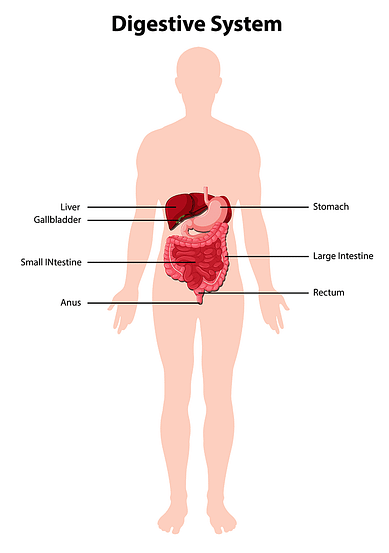
The Basics of Nutrition
We all want to be healthy, energized, and alert. The question is, how can we achieve optimum health? There are endless fad diets, elixirs, health ‘experts,’ and MLMs that promise vitality if you only adhere to their restrictive diet, take their supplements, or pay for their coaching. These are not the foundations of nutrition.
All that noise makes it hard to know what the key is to a healthy lifestyle. There must be a way for regular people to navigate their bodies and feel good without being dependent on others for everyday decisions.
Well, here’s some good news. You can take control of your health by understanding the foundations that lead to the healthy lifestyle you desire. Let’s look at the five foundations that the Nutritional Therapy Association (NTA) recommends.
The NTA’s approach is to address these five foundations by eating properly prepared nutrient-dense whole foods and addressing sleep, stress, and movement.

Digestion
So many health issues can be improved by addressing digestion. One of the basics of nutrition that is often overlooked happens to be the starting point for nutritional balance and optimum health—digestion. It doesn’t matter if you are eating the most nutritious whole food diet if your body can’t properly digest and absorb it.
Have you ever experienced heartburn or acid reflux? Indigestion? Gas, bloating, constipation, nausea, or diarrhea? These are all digestion related symptom that can be uncomfortable but can also lead to serious diseases and chronic health problems like IBS, Chron’s disease, and bowel obstructions, if not addressed.
These symptoms are clues from your digestive system, letting you know it isn’t working correctly, which means your body isn’t getting all the nutrients available from the foods you’re eating.
What does proper digestion look like as one of the basics of nutrition?
Digestion is a north to south process, meaning that it starts in the brain and nervous system and ends through the expulsion of stool, AKA poop.
Digestion starts in the brain
Let’s start at the top. Before you even take a bite of food, the look, smell, and taste of the food cause your brain to signal the body to begin digestion. Saliva begins to flow into the mouth, which is where the process starts.
As you chew your food, your teeth break the food down into small pieces that your stomach can handle. Your saliva also breaks the food down further and is vital for the breakdown of carbohydrates.
Digestion moves to the stomach
The thoroughly chewed food makes its way through the esophagus and down into the stomach, for a warm bath of stomach acid. The acid in the stomach continues the digestive process as the absorption of proteins begins.
Provided that the stomach reaches its proper highly acidic state, it destroys many harmful bacteria and pathogens in this purifying acid bath. The stomach is a major player in immune health for this reason.
After the stomach processes food, it enters the small intestine mixing with enzymes for processing nutrients and bicarbonate to reduce acidity levels. Bile, a substance created in the liver and stored in the gallbladder, is released into the small intestine, aiding the absorption of fats into the body.
Digestion finale
The digested food moves through the small intestine where fats, carbohydrates, and nutrients are absorbed into the bloodstream and distributed throughout the body.
The digestive process should break down all foods particles before entering the large intestine for final absorption. Lastly, the digested food makes its way through the large intestine and is expelled as poop.
This is how digestion is supposed to work. There is plenty of room in the digestive process for things to go terribly wrong.
Here are three things you can do to aid digestion.
- SLOW DOWN and focus on your food
- Chew your food at least 20-30 times until it’s a smoothie consistency
- When you have digestive symptoms, your body is telling you something isn’t right; listen to it.

Blood Sugar Regulation
Have you ever woken up in the morning feeling exhausted? Had an after-lunch crash, or a sugar rush followed by a major energy crash? These are all examples of what happens when your blood sugar is out of whack.
Blood sugar regulation is one of your body’s top priorities. There are complex systems that tightly control your blood sugar levels. If these levels are off, even by a little bit, the brain kicks into gear and lets multiple systems know that you must take action.
In the past, humans only had access to sweet foods a few times a year in the form of honey, fruit, and similar foods. Because these foods were rarely available and had benefits when consumed on occasion, the human body developed cravings sweet foods. It was ok to eat a lot of naturally sugary foods a few times a year. If we only eat sugary foods a few times a year, our bodies can regulate the sugar spike and store excess sugar throughout the body for future energy needs.
However, the mass distribution of refined sugars starting in the 1600s, and readily available highly processed foods, have contributed to the global blood-sugar crisis we have today. Many chronic health issues we see today are due to elevated blood sugar and underlying stress. Blood sugar imbalance and constant stress create a negative feedback loop in the body that can cause chronic energy issues, inflammation, and ultimately life-threatening diseases.
Our once healthy cravings drive us to over-consume in a world of readily available overly sugary foods.
Balancing Your Blood Sugar Levels - A Foundation of Nutrition
So, what can you do to assist your body’s natural blood sugar regulation in achieving consistent energy levels and low stress? Here are a few lifestyle and dietary changes as a foundation of nutrition, so you can start making today to balance your blood sugar levels.
Top lifestyle changes to balance blood sugar:
- Incorporate some form of movement or exercise a few times per week
- Make sure you are getting at least 7-8 hours of sleep per night
- Reduce stress and practice mindfulness, especially around mealtimes
A practical way to reduce stress around mealtimes is to have a gratitude routine before meals like praying and thanking God before meals or giving thanks in your heart as you prepare to eat. Then take three deep breaths in through your nose, filling your lungs all the way, and exhaling slowly through your mouth, feeling your muscles relax as you release stress.
Finally, smell your food, preparing your body for the meal.
This is one of the easiest of the basics of nutrition to apply!
Top dietary changes to balance blood sugar:
- Cut out processed foods and refined sugars
- Limit natural sugar intake based on your body’s needs
- Eat proteins, fats, and carbohydrates at a ratio appropriate for your body
- Don’t overeat

Essential Fatty Acids
Fatty acids play many essential roles in the body. Fats have gotten a bad rap due to bad science and influence from major food companies. There are a few types of fats that aren’t good like trans fats, but other fats like saturated fats play important roles in properly establishing the basics of nutrition in your diet.
Here are a few of the critical roles that fats play in the body:
- Provide slow-burning, long-lasting energy
- Make up cell membranes
- Manage the inflammatory process
- Absorption of fat-soluble vitamins A, D, E, and K
- Formation and function of hormones and prostaglandins
- Builds healthy cholesterol and bile
- Slows digestion
- Are satiating (fills you up fast and make you feel full longer)
Fats also make food taste amazing! Everything’s better with butter!

Mineral Balance
Minerals are involved in tons of vital functions throughout the body and are a foundation of nutrition.
Here are four significant functions that minerals impact:
- Contracting and relaxing muscles
- Acting as cofactors for enzyme reactions
- Regulating tissue growth
- Providing structural and functional support
The following are some examples of minerals and the functions they perform:
Zinc: Essential to producing stomach acid, synthesizes cholesterol, fats, and proteins, critical for cell growth and cellular replication of DNA.
Magnesium: Relaxes skeletal muscles, activate enzymes for protein and carbohydrate metabolism, necessary for DNA production and function.
Calcium: Mineralizes bones and teeth, necessary for muscle contraction, influences nerve and cell membranes, and is required for cell division.

Hydration
Water is the most important nutrient for the human body. We can go for weeks without food, but only a few days without drinking water.
Proper hydration is required for almost every major system in the human body to function.
The average modern American suffers from chronic dehydration.
Common signs of dehydration are:
- Fatigue
- Muscle Cramps
- Brain Fog
- Headaches
- Anxiety
You can eat nutrient-dense whole foods, with a macro-nutrient ratio that works for you body, but if you don’t drink enough water, you’re never going to feel your best. Chronic dehydration can lead to major long-term health problems.
Stay hydrated by drinking water when you:
- Wake up in the morning
- Feel thirsty
- 30-minutes before each meal
- Experience symptoms of dehydration
Make sure that you are getting enough electrolytes to improve water absorption into your cells.
Practice the Basics of Nutrition for Optimum Health
Throughout this article, we discussed the five foundations of nutrition recommended by the Nutrition Therapy Association: digestion, blood sugar regulation, fatty acids, mineral balance, and hydration.
Permanent changes don’t happen overnight. By starting with small changes and focusing on one foundation at a time, you can improve the way you feel and positively change your life.
You can start by incorporating more nutrient-dense whole foods into your diet, reducing your consumption of fast foods, and learning to enjoy the journey of healing your body with food.
Today is the day to start your journey to a happier, healthier, more energetic you!
